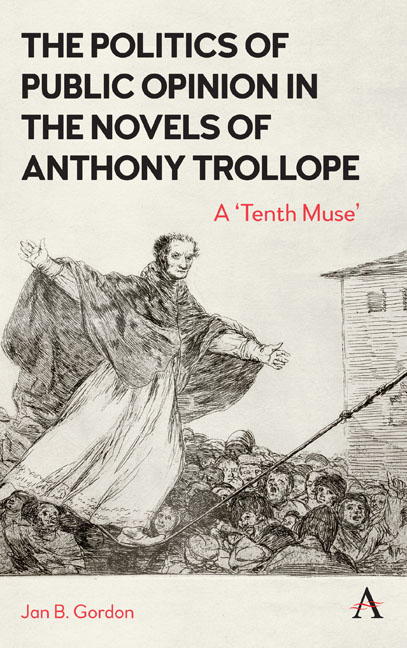Book contents
- Frontmatter
- Frontispiece
- Contents
- Preface: Overture to an Initial Public Offering
- Chapter One The “Prosthetic Body” of Public Opinion in Barsetshire
- Chapter Two Miming the Law
- Chapter Three “Playing” the Opinion Market
- Chapter Four The “Management” of Public Opinion in Trollope’s Bureaucracies
- Chapter Five The Sugar
- Index
Chapter Three - “Playing” the Opinion Market
Published online by Cambridge University Press: 17 October 2023
- Frontmatter
- Frontispiece
- Contents
- Preface: Overture to an Initial Public Offering
- Chapter One The “Prosthetic Body” of Public Opinion in Barsetshire
- Chapter Two Miming the Law
- Chapter Three “Playing” the Opinion Market
- Chapter Four The “Management” of Public Opinion in Trollope’s Bureaucracies
- Chapter Five The Sugar
- Index
Summary
She had so far played her game well and won her stakes.
(ED 7)To address a specific kind of play in Trollope's Barsetshire Chronicles and the Palliser Novels is to encounter serious risks, not unlike those characters who commit to “gaming the system” in such radically different ways. If public opinion functions like traditional characters in a novel (as an imaginary, assembled body constructed by author, other characters, critics and readers), then we might logically expect development through time in the model of the Bildungsroman. A shared ideological body would mature into self-awareness, finding a secure place in the culture from which it initially seemed exiled. If public opinion, however, functions only as negation of the conventional body or part of some imaginary public sphere purged of individual interest, then its operations upon a system—its role in generating the consequential—would be of primary importance. It is, in a number of ramifications, “everybody” and “nobody” as we have seen. As part of an imaginary body, it would be defined in part by an account of inward investments of faith that enact it: Who came to believe in it and under what conditions? Who would hope to realize a return, be it professional, financial, comfort or public esteem, that might pay dividends in the future? To what extent are those who invest in public opinion really speculating on it, as opposed to pursuing or purchasing it, so as to be sufficiently nimble to vacate a position? The literary critic enjoys no exemption.
As a concept, play carries a considerable surplus of cultural baggage and literary history. We might, for example, commence with Huizinga's work and move through that of Roger Caillois to the various accounts of the performative “knights of misrule” in the Renaissance theater. Although all of these may “come into play,” Trollope rather uses the concept differently. It becomes synonymous with insincerity or the shirking of hard work and responsibility, hence duplicating the idleness of the privileged as they play social and conversational games that seem opposite to work. It is neither chance nor simulation, as Caillois suggested, nor is it invariably competitive.
- Type
- Chapter
- Information
- The Politics of Public Opinion in the Novels of Anthony TrollopeA 'Tenth Muse', pp. 83 - 126Publisher: Anthem PressPrint publication year: 2023

